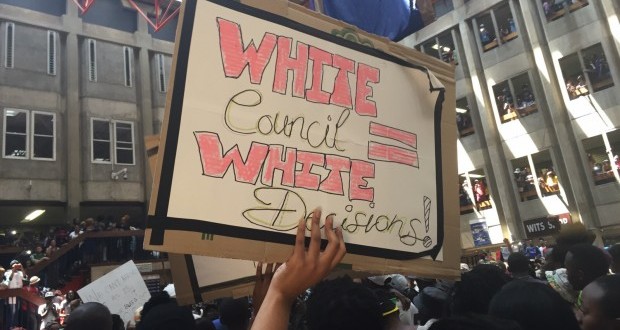KHANYISA MELWA says that in order for universities to be truly decolonised, the structure of the senate must be challenged.
Over the December holiday my friends and I decided to go to a white establishment for some craft beer and supper, and subsequently became the 0.25% of the black population which had, for those few hours, assumed a close proximity to whiteness.
This is the extraordinary case when a black person enters a space dominated by white people – you become the minority in a country in which you are the majority.
This proximity is further enhanced by the class privilege all four of us have achieved at the back of our parents’ upward social mobility. Not to mention the unearned cis-heteronormative privilege.
So, we manage to blend in well in such spaces, and we are “accommodated†favourably because we speak like white people, went to school with them and even work with them. This makes the process of assimilation to whiteness that much easier and even covert.
Often the expectation is that one must not dissent from this position of social power, and some won’t.
In an attempt to free ourselves from the suffocating vice-grip of whiteness we decided to express our blackness by inscribing our thoughts on available surfaces. And no, this was not vandalism (as some would like to purport), as the tables and doorframes in the restaurant had already been adorned with similar artwork – therefore a precedent had been set.
I was the first to ask for a koki pen and began writing “Biko lives†on our table. I then stood up and approached the door-frame and only managed to scribble “Disrupting…†before I was abruptly stopped by my group of friends who warned me to not go too far – lest we anger the white man and not be served. With some reluctance, I refrained from finishing that sentence, which I had intended to read: “Disrupting whitenessâ€.
Similar attitudes of deference towards whiteness (read power) have become increasingly evident among groups of people who would otherwise be thought to be “progressiveâ€. This is often the case in the academy (at NMMU at least) where progressive academics, and to some extent senior administration staff, who understand and advocate for the decolonisation project will keep mum for fear of being chastised or even fired. The university’s functionalist and dogmatic approach to decoloniality is partly to blame for this. As well as the anti-decolonisation agenda that is propagated by the PE Tech/University of PE cohort of academics who refuse to move to the left.
The consequence of having a progressive collective that is also acquiescent is that we struggle to identify the academics who are willing to deconstruct or disrupt the current nature of the Senate’s power. In fact, I don’t think we have begun to interrogate enough how powerful the Senate is at institutions of higher learning.
I emphasise the importance of challenging the power of the Senate because this is the body that takes decisions on the curriculum of the university and, consequently, it determines the intellectual paradigm or posture of institutions of higher learning. I need also mention that this collective (Senate) is made up of mostly white middle-aged men who reminisce about the “good old†apartheid days. Vice-chancellors are in fact at the mercy of the Senate, as it is the Senate that controls knowledge dissemination (Teaching & Learning) and knowledge production (Research) – the core business of universities.
Universities, as microcosms of society, are the think-tanks from where other sectors of society draw both intellectual and human capital. Therefore, everything which emanates from universities can either bode ill or well for society – depending on the intellectual posture of the higher education sector. Right now, universities serve as a conveyor belt which leads straight into an exploitative capitalist system owned by white people – your Oppenheimers and your Ruperts. In fact, I am tempted to walk across the graduation stage this year with a sign that reads: “Off to sell my labour to white monopoly capitalâ€.
Until such a time as progressive academics heed the call to begin disrupting the normal processes of the academy and usher in a more progressive Afrikan intellectual paradigm – we will remain in the morass in which we find ourselves.
The movement (Fees Must Fall and Rhodes Must Fall) needs to forge strong alliances with academics and begin to agitate for the reconfiguration of Senate. Senate can no longer be another old-white boys’ club.
In the same way that my friends and I decided to normalise black thought in an otherwise white social space – so too should black academics begin to normalise Afrikan epistemology in a largely white academic space.










